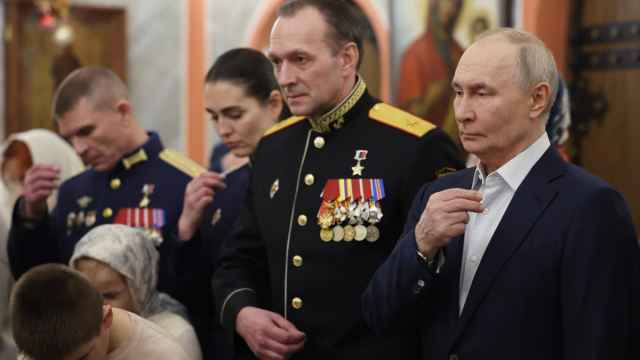Prime Minister Vladimir Putin on Tuesday supported a proposal to rate Russian regions by their business climate but warned business leaders not to expect an easing of bureaucracy until they prove that they're able to wean themselves off irresponsible practices.
Speaking at a meeting with the members of the business lobby group Delovaya Rossia, Putin said responsibility for improving the business environment lay as much with businesses themselves as with the state.
“It's a two-way street,” the prime minister said, according to a transcript on the government web site. “Of course, the government sets the tone and formulates the rules and conditions, but nonetheless, it's the business community itself that creates an atmosphere conducive to its activities.”
“It's about respecting the laws and fulfilling obligations, about a conscious rejection of all gray and dark schemes. And not because you could be caught, but because deceiving consumers or your own employees, and not paying taxes — that's indecent,” Putin added.
The meeting focused on how to improve the climate for business development in the country. Russia was ranked 120 out of 183 countries by Doingbusiness.org in its 2010 index of national business environments.
Members of Delovaya Rossia who attended the meeting said they had won government backing for two proposals: the creation of a rating system for the investment climate in individual regions and a public-private center for the battle against corruption and corporate raiders.
“Today we presented the government with the idea of creating a rating for every region of the Russian Federation based on the local business climate. The prime minister supported the idea, and we've already begun discussing how it will work in practice,” Alexander Galushkin, deputy chairman of Delovaya Rossia, said after the meeting.
It's not entirely clear how the “public-private” rating would work in practice, but Galushkin told The Moscow Times that he could already identify key factors that feed into a local economy's attractiveness.
The best places to do business in Russia include the Ulyanovsk, Kaluga and Yaroslavl regions, thanks to carefully prepared infrastructure and business parks, and governors who are prepared to get personally involved in attracting investors, he said.
“The ideal governor gives investors his telephone number,” Galushkin said. He refused to name the regions he thought were the worst for business.
Earlier Tuesday, Vedomosti reported that the group had already compiled a “black list” of Russian regions and governors who presided over particularly poor business environments — with the Moscow region and the capital itself at the bottom of the list.
Delovaya Rossia spokespeople denied that any such list already existed.
But the group, which has established itself as a monitor of the business climate in the country, unveiled plans for a public-private center for fighting against corruption and corporate raiding.
The centerpiece of the project will be a web site at DalVzyatku.ru — Russian for "to have given a bribe." The site will monitor the scale of bribery and record specific instances of corruption.
The project also envisions a “black list” of judges, officials and businessmen who have broken the law or violated business ethics, Galushkin said. It is unclear when the project will go live.
Corruption experts were skeptical about the use of shame tactics to fight what Putin called “dark and gray practices,” however, noting that corruption-related crimes are very difficult to prove.
“Five years ago, they tried out a so-called 'black book' of corruption in the Amur region,” said Kirill Kabanov, head of the National Anti-Corruption Council. “Of course, it's right that people should say, look, that person has done something wrong. But if I give you a bribe, that's a crime. And there should be legal penalties for it.”
A Message from The Moscow Times:
Dear readers,
We are facing unprecedented challenges. Russia's Prosecutor General's Office has designated The Moscow Times as an "undesirable" organization, criminalizing our work and putting our staff at risk of prosecution. This follows our earlier unjust labeling as a "foreign agent."
These actions are direct attempts to silence independent journalism in Russia. The authorities claim our work "discredits the decisions of the Russian leadership." We see things differently: we strive to provide accurate, unbiased reporting on Russia.
We, the journalists of The Moscow Times, refuse to be silenced. But to continue our work, we need your help.
Your support, no matter how small, makes a world of difference. If you can, please support us monthly starting from just $2. It's quick to set up, and every contribution makes a significant impact.
By supporting The Moscow Times, you're defending open, independent journalism in the face of repression. Thank you for standing with us.
Remind me later.





